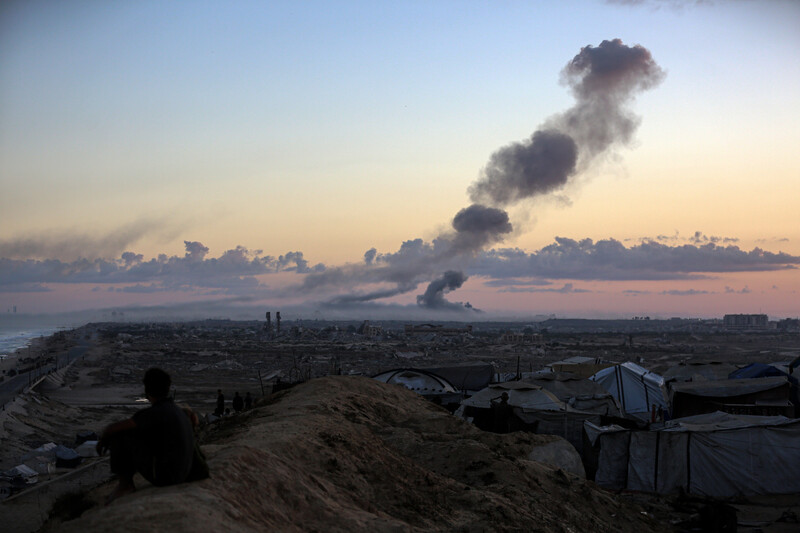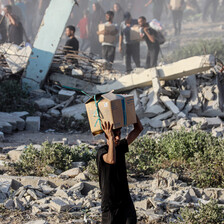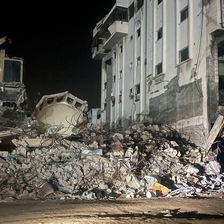The Electronic Intifada 8 October 2025

Smoke rises over southern Gaza City following a series of Israeli airstrikes, 7 October 2025. (Omar Ashtawy / APA Images)
On 9 September 2025, Mahmoud Al-Qershali, my youngest uncle, visited my family at around 6 pm in Deir al-Balah. He was exhausted from traveling along the unpaved road from the north to the south under the burning sun all day.
But it was necessary work, as he saw it, saving his family’s belongings from further Israeli strikes on Gaza City.
“I loaded up the cart and started the hellish journey to the south at around 7 am,” Mahmoud said, out of breath.
“It was around 5 pm when I finished unloading the packages,” Mahmoud continued. “This is the third cart that I unloaded in the south. I took everything I could from my apartment and my father’s apartment.”
While my mother was preparing lunch, a can of tuna with some lemons and onion, I asked her why don’t we do the same and move all of our belongings from the north in Gaza City here to the south.
Over the previous several days, since 5 September, the Israeli military had bombed at least seven high-rise towers in Gaza City. Then, on 9 September, the military had dropped leaflets over Gaza City ordering an evacuation and threatening a major military operation.
My mother and father and I have been displaced in Deir al-Balah since October 2023, living in a rented warehouse. We had been forced to leave our home in al-Wihda Tower in Gaza City after Israeli bombardments, and I now wondered if we should retrieve our furniture and belongings from the tower, in anticipation of an Israeli attack.
After my father and uncle ate, my mother told my father that we should return to al-Wihda Tower and retrieve whatever we could.
I suggested to my father that we could also sell the furniture that we did not have room for in Deir al-Balah.
“The occupation is bombing towers,” I said, “so it is just a matter of time before the complete destruction of our home.”
“I spent my life working to buy that stuff,” said my father, who had worked as a pharmacist for more than 15 years. “I would rather see them beneath the rubble than sell them at a trifling price.”
10 September
My mother woke me up at 5:30 am to get ready for the trip north. I knew it would be a long and exhausting day.
It would also bring back memories of the lives we had lived before the genocide.
Mahmoud had suggested that we rely on the services of a cart driver named Ramzi, who would be in the Nwiri area in Nuseirat around 6:30 am.
I was uncertain about this, as I knew that riding in an animal-drawn cart would exhaust my mother, and we had a lot of work to do. I started asking tuk-tuk drivers if they would be available today and how much it would cost, as a motorized tuk-tuk would be faster than a cart.
Most of them were already busy transporting people, though two of them said they would be available around 5 pm.
After negotiations, one driver agreed to take $100 in cash and an additional $100 to cover the bank transfer fee. Another driver agreed to take $150 in cash.
I took their phone numbers, sent them to my father, and went to sit in the street next to my mother, brother and uncle, who were still waiting for Ramzi, the cart driver.
Nwiri was full of cars and carts picking up people and transporting them to the north.
At around 8 am, we were all sunburnt and Mahmoud and I headed to Ramzi’s home, to see what was the holdup. The road was an open desert, with no shade.
Mahmoud thought Ramzi’s home was nearby, but we ended up walking for more than an hour to reach the home, asking neighbors along the way if we were headed in the right direction.
Ramzi’s brother told us that Ramzi had left with the cart to the north. Desperate, Mahmoud asked Ramzi’s brother to call Ramzi.
Ramzi’s brother then said that would not be possible, as Ramzi’s phone was here, charging.
Mahmoud and I returned to Nwiri, stopped a car and headed north along with my mother and brother. We had wasted a long time waiting.
We spent more than an hour on the unpaved road that was crowded with hundreds of displaced people, their arms and carts full of belongings as they made the trek south.
At around 10 am, the car dropped us off at al-Tashriei crossroads, about four miles from Deir al-Balah. From there we went with my uncle to my grandfather’s home to rest, as we were all tired.
On our way to my grandfather’s home, my brother found a falafel shop and I bought everyone sandwiches and we continued walking.
At my grandfather’s home, on the wide and spacious first floor of a five-story building, my mother went to the bathroom, and my younger brother Omar and I went to chat with our cousin Fadi.
Arrival at al-Wihda Tower
An hour later my mother, brother and I headed to al-Wihda Tower, where we once lived.
The tower was badly damaged. But during the ceasefire some of the residents had fixed the stairs using some wood from the destroyed apartments.
When we reached the apartment at around 11:30 am, we gathered what we could of our belongings. I grabbed my diary, a book that the organization We Are Not Numbers gave to me back in June 2023 and some clothes.
Omar also grabbed some clothes, his school backpack and his swimming goggles from under the rubble.
My mother took some utensils from the kitchen and some blankets and pillows. Omar was helping my mother when I left to see my friends.
I reached my friend Kareem’s nearby stall around 1:30 pm. Next to him, my friend Osama had set up another stall and was selling stationery and some children’s games and books.
While drinking tea, I chatted with them about whether they would evacuate south or remain in the north.
Osama said that he had searched for a place in the south but could not find a place to go, so he would remain in the north. (I would later learn that Osama would evacuate on 22 September, as the occupation tanks reached the neighborhood.)
That same day, the Israeli occupation had dropped leaflets on the neighborhood of al-Nasr and on Beach refugee camp – also known as al-Shati – telling residents to evacuate. I told my mother about this when I returned to the apartment, and she said that this time at least we would have our things.
We remained at the apartment until around 9:30 pm, preparing the bags. We then walked to my grandfather’s home to stay the night.
We would have to be heading back south soon, but that night we would stay in the north, and we are lucky to have survived.
Occupation bombardments
That night was one of the worst I have lived through.
I had walked back to the neighborhood to visit my friend Muhammad, and the sound of Israel’s bombardments was ear-piercing.
The streets around al-Wihda Tower were lit with illumination flares, but to me they look like lightning, and they light up everything.
It was dangerous, but I continued on the walk, since it would be the last time to gather with Muhammad and my other friends.
When I arrived, we cooked noodles and sat down to eat. We chatted more about the possibility of their relocating south and the problems that would come with it.
At midnight, I left them and went to join my mother and brother.
The street was silent, wrapped in darkness.
I entered the house quietly, then I laid down on a mattress next to Omar and fell asleep.
11 September
My mother woke me up at 7 am to return to al-Wihda and bring down the bags for the tuk-tuk driver. We were prepared to haul 19 bags, eight pillows and four mattresses down the crumbling stairs.
While Omar and I were carrying the bags down, our neighbor on the ninth floor saw us and told us that he had a pulley for us to use.
I called Kareem to come and help me.
I was on the ninth floor, and Kareem was on the sixth floor, tying the bags to the hook at the end of the pulley’s rope.
Omar was on the ground floor untying the bags and keeping his eyes on the stuff we had already brought down.
After loading up the bags and mattresses in the tuk-tuk and strapping them down with a heavy rope, there was no space for anyone. I climbed the mountain of belongings to direct the driver, and my mother and brother went to al-Tashriei crossroads to take a car to Deir al-Balah.
Hundreds of others were on the road south. I had to cling to the rope of the tuk-tuk along the bumpy road.
I reached the warehouse where we are living in Deir al-Balah around 3 pm and unloaded the packages, paid the driver and sat to rest as I could not feel my hands from lifting the pulley.
Displacement has never been easy.
On the first day I was displaced in October 2023, I slept on the street.
Now, since the beginning of September, I see several family members and friends are in the same situation. They know that they would be living a wretched life in tents, but they evacuated anyway.
They long to survive and to accomplish their dreams.
Khaled Al-Qershali is a writer and translator.





